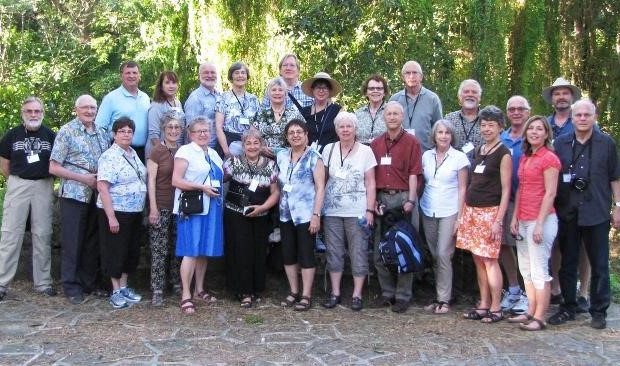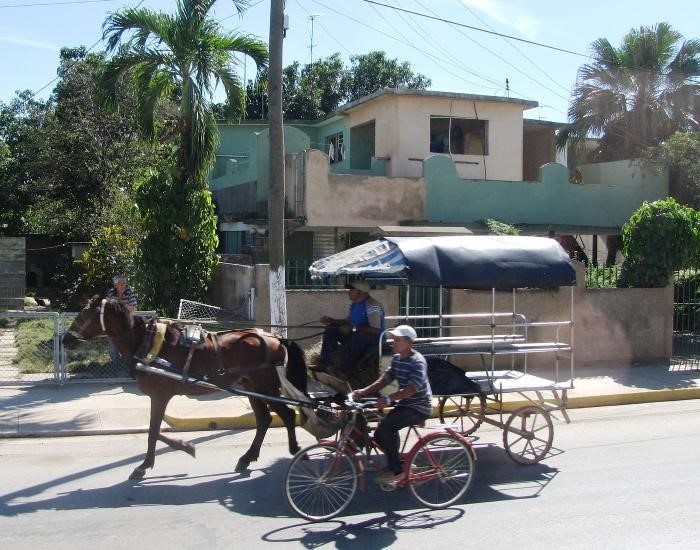
By Bill Braun
Twenty-five of us, 19 from the United States, joined together for 10 days during January in Cuba. Billed as “Fresh Perspectives,” our tour was that, plus many entirely new and somewhat contradictory perspectives. Our tour guides, Jack and Irene Suderman, frequent visitors to Cuba over the years, seemed to relish placing us in positions of incongruity.
We were forced to live with it, talk about it, ask more questions and finally realize that not everything fit into our preconceived boxes. Perhaps more important, we realized that we live with contradictions and ambiguity back home as well. The homegrown varieties seem to be more comfortable.
The obvious joy of those living in difficult economic circumstances was inspiring. The careful way some of our questions were answered was noticed. The growth of the church in a country that registers churches was amazing, alongside what appeared to be relatively unhindered growth of unregistered congregations. The cooperation of the church with government agencies provoked comparisons to the United States and Canada.
The presence of U.S. and Israeli projects and products was surprising because the United States and Israel regularly vote, with one recent notable exception, to maintain the blockade. In fact, Israeli business in Cuba is notable given the Cuban support of Palestinian issues in the United Nations.

Four million tourists are annually being fed sumptuously in all-inclusive resorts in a country that must import 85% of its food and in which the average citizen spends 90% of household income for food. It’s all the same Cuba, no matter which part you encounter.
We visited a Brethren in Christ congregation on our first Sunday morning. They received us warmly, we worshiped together with joy and we were fed in abundance. What a great morning! We then began to wonder where all this food appeared from, given that the average monthly cash income for individuals is $15 and the ration card for basic food is normally insufficient.
We were told that the church was reimbursed by our group, but they had likely borrowed money to provide the food up-front, trusting that we would reimburse. The hospitality and joy of folks in such a tight economic situation inspired us and caused us to wonder about our own hospitality.
The Christian Centre for Reflection and Dialogue led by Raimundo Garcia is an example of Cuban contradictions. Garcia is a veteran of the Revolutionary Army in 1959 who discovered Anabaptism while studying theology. He survived a three-year remand to a rehabilitation camp in the mid-1960s and decided to stay in Cuba rather than leave like many of his contemporaries.
The Centre was given land by the Communist mayor of the city. Garcia fought for national registration and to keep the name “Christian” in the title—and won. In a country where identity is defined in opposition to another—Cuba versus the United States, those who stayed versus those who left—the Centre focuses on reconciliation. Garcia says the existence of the Centre isn’t logical. It was another amazing encounter in contradiction.
We were privileged to traverse a significant area of the western part of Cuba where we became acquainted with the term the equality of insufficiency. It’s obvious that Cuba suffers a significant shortage of basic resources with which to maintain infrastructure, innovate in agriculture, advance in technology, feed its people or develop its natural resources.
It’s just as obvious that there is broad equality among the population. Crime is low and the visible police presence is minimal. I saw no military, even at the airport, only ordinary security personnel. Stories indicate that there is access to basic healthcare for all and free education through university. Cuba trains enough physicians and nurses to meet its own needs and send many abroad. The country appears orderly and relatively clean. The people are warm and friendly.
I began to wonder what I would trade in Fresno for a sense of safety, clean and hospitable neighborhoods and broad access to healthcare and education. Are the positives the result of the intrusive hand of government that is unseen to visitors? Is a society that appears as rather simple and uncomplicated actually the result of insufficient resources? I have no clear idea. On this one, the wonder of Cuba in comparison to my own experience clearly overcomes the certainties of fact.

Braun.
Cuba is changing. What has been characterized as the “experiment” of the revolution in 1959 continues. In the past eight years since the transfer of power from Fidel to Raul Castro, micro-enterprise efforts have been strengthened to help revive a dependent and stagnant economy.
In a population of nearly 12 million people, approximately 500,000 micro-enterprise endeavors have been approved. These are often bed-and-breakfast ventures in homes marked by a standard sign outside of the house. The small tobacco farmer we met is now allowed to keep 20% of his crop to dispose of as he chooses.
The experimental farm run by the Christian Centre for Reflection and Dialogue produces organically raised food, has created a biomass digester to capture and use methane, has begun a fruit and vegetable preservation program and trains others to do the same. A part of their proceeds goes to the state and a part is kept for the farm.
These signs of hope can seem small in the face of the real obstacles present in the form of state control of nearly everything, the 60-year-old U.S.-led blockade and the long history of domination from the outside.
While we sensed a variety of contradictions during our short visit, we also experienced a consistent message from the Cuban church to our home congregations. We were shown that a life of following Jesus isn’t different in Cuba than in the United States or Canada.
The oft-used image of different persons each holding to a different part of the elephant reminded us that the elephant actually looks about the same on either side of the blockade. Now some of us know that.
*****
Bill Braun, retired pastor at College Community Church Mennonite Brethren in Clovis, traveled to Cuba with TourMagination. Founded in 1970 to share the Mennonite heritage story in Europe, TourMagination has led faith-based group tours in more than 50 countries and to every continent. Each TourMagination tour is designed to provide an opportunity for travelers to expand their faith as they explore both well-known and distinctive sites. In addition to pilgrimages and Holy Land tours with a peace focus, TourMagination offers cultural learning, natural wonders, heritage and custom tours, as well as cruises.
